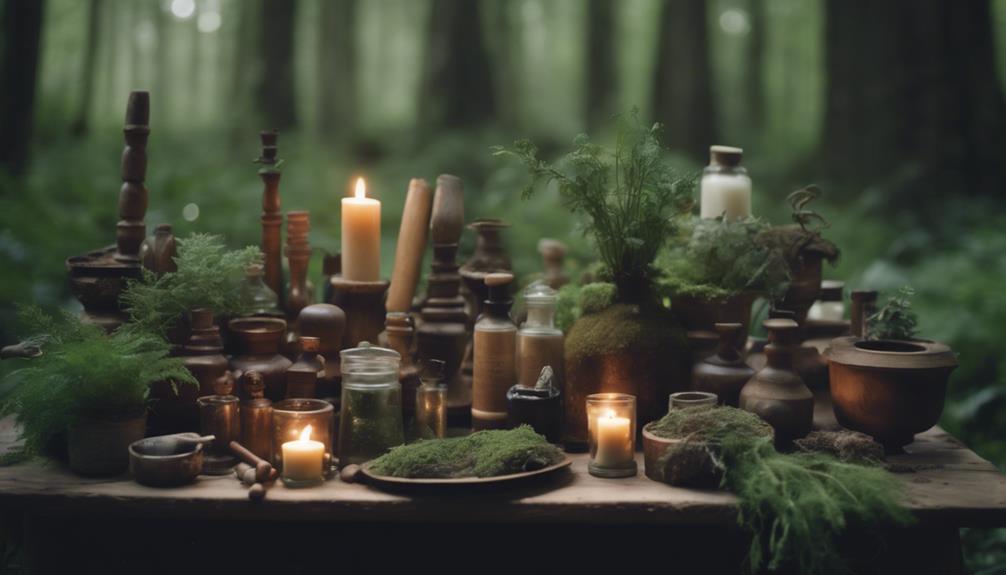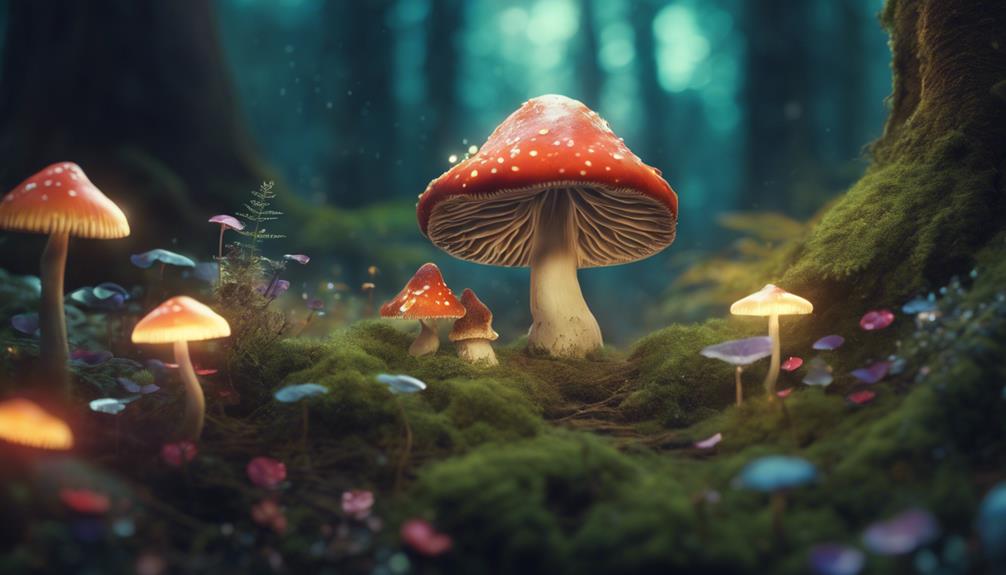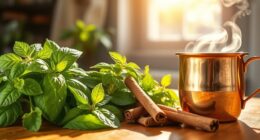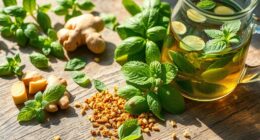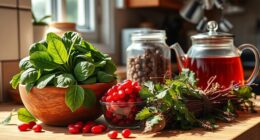We've discovered that pursuing a career in herbalism can lead to a diverse range of fulfilling professions. For instance, we can become clinical herbalists, developing personalized treatment plans for clients, or focus on herbal medicine making, sourcing high-quality herbs and following production quality control measures. We can also explore natural health consulting, developing bespoke formulations for specific health conditions, or create herbal content, write about plants, and photograph their beauty. Other options include sustainable herb growing, herbal store management, teaching herbalism, and culinary arts with an herbal focus. As we explore these professions, we'll uncover even more opportunities that combine our passion for natural health and sustainability.
Key Takeaways
• Clinical herbalists can work in private practices, creating personalized treatment plans and developing specific herbal remedies for clients.
• Herbal medicine makers source high-quality herbs and follow production and quality control measures to create effective remedies.
• Natural health consultants advise clients on natural remedies, providing personalized guidance on incorporating natural health practices.
• Botanical formulators develop private product lines, create bespoke formulations, and collaborate with healthcare professionals to create treatment plans.
• Herbal content creators, including writers, artists, and influencers, share their passion for herbalism through various media channels.
Clinical Herbalist Career Paths
Exploring the field of clinical herbalism, we find that many practitioners opt for private practices, creating personalized treatment plans tailored to individual clients' needs. This approach allows them to focus on gathering specific herbal remedies that cater to each client's unique requirements. In doing so, clinical herbalists can develop strong relationships with their clients, understanding their health concerns and providing targeted solutions.
Some clinical herbalists take their practice a step further by operating mobile clinics or herbal pop-ups, bringing their expertise to underserved communities. These mobile clinics enable them to reach a broader audience, providing essential herbalism services to those who may not have access to them otherwise. By combining their knowledge of herbalism with community clinic work, clinical herbalists can make a significant impact on public health.
As they gain extensive experience, many clinical herbalists go on to develop their own product lines of herbal medicines, further expanding their reach and influence in the field of herbalism.
Herbal Medicine Making Professions

As we explore the field of Herbal Medicine Making Professions, we're excited to learn about the various roles that bring herbal remedies to life.
We'll examine the art of creating herbal remedies, the importance of natural health consulting, and the intricacies of botanical formulations development.
Herbal Remedies Creation
We craft a wide range of herbal remedies, from tinctures and salves to teas and infusions, as Clinical Herbalists and Medicine Makers. Our work involves carefully selecting and combining herbs to create effective remedies for various health concerns. As crafting professionals, we take pride in our attention to detail and commitment to quality.
Here are some key aspects of our herbal remedies creation process:
- Sourcing high-quality herbs: We work closely with herb growers and farmers to obtain the freshest and most potent herbs for our remedies.
- Formulation and blending: We carefully formulate and blend herbs to create unique and effective remedies for specific health concerns.
- Production and quality control: We follow strict production and quality control measures to make certain our remedies meet the highest standards.
- Labeling and packaging: We carefully label and package our remedies to provide clear instructions and guarantee safe use.
Natural Health Consulting
By leveraging our herbal medicine making skills, we advise clients on natural remedies as Natural Health Consultants. We combine our knowledge of Herbalism and Alchemy to provide personalized guidance on natural health solutions.
As herbal medicine makers, we create various herbal medicines for clients seeking natural health solutions. Our expertise in medicine making and herbal product formulation enables us to develop private product lines based on our herbal medicine expertise. We often work in CGMP certified labs to guarantee the quality and safety of our products.
As Natural Health Consultants, we also provide First Aid guidance, empowering clients to take charge of their health. Our role goes beyond just advising on herbal remedies; we educate clients on how to incorporate natural health practices into their daily lives. By doing so, we empower individuals to make informed decisions about their health and wellness.
With our expertise in herbal medicine making, we bridge the gap between traditional medicine and natural health solutions, providing a holistic approach to healthcare.
Botanical Formulations Development
We craft bespoke botanical formulations, combining art and science to create innovative herbal medicines that promote health and wellness. As professionals in botanical formulations development, we undergo extensive training in medicine making and herbal product development. Our expertise lies in crafting items that embody the principles of herbalism and alchemy, where nature meets science.
Our work involves developing private product lines, consulting for herbal product brands, or working in CGMP certified labs. We've various opportunities to explore, including:
- Creating private herbal practices, offering mobile clinics, and supplying herbs to herbalists.
- Engaging in herbal writing, herbal artistry, herbal research, or consultancy for herbal companies.
- Developing bespoke formulations for specific health conditions or wellness goals.
- Collaborating with other healthcare professionals to create thorough treatment plans.
Sustainable Herb Growing Careers

As we explore sustainable herb growing careers, we're committed to examining the practices that make a real difference.
We'll look at how organic farming methods can promote healthy soil and minimize environmental impact, as well as eco-friendly land management strategies that prioritize biodiversity and conservation.
Organic Farming Methods
Exploring herbs sustainably through organic farming methods not only guarantees a healthier environment but also supports local food systems and promotes eco-friendly agriculture. As we investigate the world of sustainable herb growing careers, we realize that organic farming methods are at the heart of it all. By adopting these methods, we can make sure that our herb gardens thrive while minimizing our ecological footprint.
Here are just a few ways organic farming methods contribute to a sustainable future:
- Soil conservation: Organic farming promotes healthier soil through natural composting and crop rotation, reducing soil erosion and preserving biodiversity.
- Natural pest control: By avoiding synthetic pesticides, we encourage natural pest control methods, preserving ecosystem balance and promoting wildlife habitats.
- Chemical-free farming: Organic farmers avoid synthetic fertilizers and herbicides, reducing chemical inputs and promoting a healthier environment.
- Local food systems: Organic farming supports local communities and food systems, ensuring fresher, healthier produce for our tables.
Eco-Friendly Land Management
By embracing eco-friendly land management practices, sustainable herb growers can significantly reduce their environmental footprint while producing high-quality herbs that benefit both people and the planet. We are dedicated to regenerative techniques that not only support soil health but also conserve natural resources. Our aim is to establish a harmonious balance between nature and agriculture.
| Sustainable Practices | Benefits |
|---|---|
| Crop rotation and intercropping | Enhanced soil fertility and biodiversity |
| Organic composting and mulching | Decreased waste and increased water retention |
| Conservation tillage and polyculture | Improved ecosystem services and minimized erosion |
As sustainable herb growers, we aim to minimize our environmental impact while providing fresh, locally grown herbs to our communities through herbal CSAs. By integrating sustainable practices, we contribute to conservation efforts and advocate for sustainable agriculture. Our dedication to eco-friendly land management ensures that our herbs are not only flavorful and nutritious but also gentle to the planet.
Herbal Content Creation Opportunities

We're constantly seeking fresh perspectives on herbalism, and that's where herbal content creators come in, exploring engaging stories and visuals that bring the world of plants to life. As we delve into the world of herbal content creation, we find a multitude of opportunities for creatives to shine.
Here are some ways herbal content creators make an impact:
- Herbal Writers: They specialize in creating content about plants, ingredients, and healing properties for books, health blogs, and freelance opportunities, sharing their knowledge with the world.
- Herbal Artists and Photographers: They capture the beauty of plants, collaborate with herbal companies for photography, and create botanical designs for sale, showcasing the aesthetic side of herbalism.
- Marketers for Herbal Companies: They deeply understand herbal products, create unique content, and enhance marketing strategies to boost brand recognition, helping herbal businesses thrive.
- Herbal Influencers: They share their passion for herbalism through social media, blogs, and videos, inspiring others to explore the world of plants and natural remedies.
Herbal Pharmacy and Retail Jobs

As we delve into the world of herbal pharmacy and retail jobs, we'll examine two crucial roles that play an essential part in this industry.
We'll discuss how herbal product specialists and herbal store managers contribute to the success of herbal establishments, ensuring customers receive the best possible guidance and products.
Herbal Product Specialist
We work closely with customers in herbal pharmacies and retail settings, using our in-depth knowledge of herbal medicine and products to guide them towards the right remedies for their specific needs. As herbal product specialists, we're responsible for helping customers navigate the vast array of herbal products available, ensuring they find the perfect solution for their health concerns.
Here are some key aspects of our role:
- Formulating herbal blends: We create custom blends tailored to individual customer needs, combining our knowledge of herbal medicine with an understanding of customer requirements.
- Product recommendations: Based on customer needs, we recommend the most suitable herbal products, taking into account potential interactions and contraindications.
- Educating customers: We provide customers with information on the healing properties of herbs, guiding them towards natural health solutions and promoting the benefits of herbal products.
- Sales floor support: We work on the sales floor, answering customer inquiries, and providing expert advice on herbal products and their applications.
Herbal Store Management
Managing an herbal store is a multifaceted role that demands a unique blend of business savvy, herbal expertise, and customer-centric approach to successfully oversee the daily operations of an herbal pharmacy or retail store. As herbal store managers, we are responsible for inventory management, customer service, staff supervision, and ensuring compliance with regulations. Our knowledge of herbal medicine, product formulations, and customer preferences is essential in creating a welcoming and informative environment for customers. We may work in brick-and-mortar stores, online herbal shops, or wellness centers, where we can apply our passion for natural health products.
| Responsibility | Skills Required | Work Environment |
|---|---|---|
| Inventory Management | Herbal knowledge, organizational skills | Brick-and-mortar stores, online shops |
| Customer Service | Communication skills, product knowledge | Wellness centers, retail stores |
| Staff Supervision | Leadership skills, herbal expertise | Herbal pharmacies, online shops |
| Compliance | Regulatory knowledge, attention to detail | Wellness centers, retail stores |
| Marketing | Business acumen, creativity | Brick-and-mortar stores, online shops |
Botanical Research and Exploration

Venturing into the uncharted territories of the plant kingdom, we commence a journey of botanical research and exploration, driven by an insatiable curiosity to uncover the secrets of medicinal plants in their natural habitats.
As we investigate further, we find that botanical research involves studying medicinal plants in their natural habitats for scientific understanding. This pursuit is closely tied to exploration, which focuses on discovering new plant species and their potential medicinal properties.
In our quest for knowledge, we immerse ourselves in the historical wisdom and cultural uses of medicinal plants, bridging traditional healing practices with modern scientific knowledge. We acknowledge that grasping plant constituents and their effects on human physiology is essential in botanical research.
Here are some key aspects of botanical research and exploration:
- Studying medicinal plants in their natural habitats for scientific understanding.
- Discovering new plant species and their potential medicinal properties.
- Immersing ourselves in historical wisdom and cultural uses of medicinal plants.
- Acknowledging plant constituents and their effects on human physiology.
Our journey intertwines with other professions, such as Alchemy and Herbalism, as well as the Skinning profession, highlighting the interconnectedness of these fields.
Culinary Arts With Herbal Focus

As we savor the flavors of the plant kingdom, our exploration of botanical research and exploration naturally leads us to the domain of culinary arts, where fresh herbs are woven into dishes to tantalize the taste buds and nurture the body.
In the domain of culinary arts with an herbal focus, chefs emphasize the use of medicinal herbs to enhance the nutritional value of meals. By incorporating fresh herbs into their recipes, they create dishes that not only delight the palate but also promote wellness and healing. This fusion of traditional cooking techniques with herbal knowledge results in delicious and nutritious meals that showcase the versatility and benefits of various herbs.
With an herbal focus, chefs can craft unique recipes that highlight the medicinal properties of herbs, aligning with the concept of food as medicine. As we explore the world of herbal culinary arts, we discover a space where flavor and nutrition blend seamlessly, offering a holistic approach to culinary expression.
Homesteading With Herbal Medicine

By embracing homesteading with herbal medicine, we cultivate a deeper connection with the natural world, growing our own medicinal herbs to harness the power of nature for our health and well-being. This skill allows us to gather herbs and create a sustainable source of herbal medicine for personal use or to share with our community.
Homesteading integrates herbal medicine into a self-sufficient lifestyle focused on growing food, herbs, and other resources.
Here are some benefits of homesteading with herbal medicine:
- Autonomy: We've control over the quality and type of herbs we grow and use.
- Sustainability: By growing our own herbs, we reduce our reliance on external sources and promote environmental sustainability.
- Holistic approach: Homesteading with herbal medicine aligns with a holistic approach to health and well-being, focusing on natural remedies and prevention.
- Community building: We can share our knowledge and herbal remedies with our community, promoting a sense of connection and cooperation.
Teaching Herbalism and Wellness

We share our passion for herbalism by teaching others how to harness the power of plants for wellness and self-care. As herbalism educators, we empower individuals to take control of their health by sharing our knowledge of plant identification, medicinal uses, and holistic healing practices.
We offer classes, workshops, and retreats to cater to diverse skill levels, from beginners to advanced learners. Our teaching involves leading plant identification walks, demonstrating herbal preparations, and guiding students to incorporate herbs into their daily lives.
By passing down traditional knowledge, exploring herbal properties, and fostering a deeper connection to nature, we promote wellness, sustainability, and self-care. As an essential part of the herbalism profession, teaching herbalism and wellness enables us to make a positive impact on people's lives.
Herbal Consulting and Formulation

In our role as herbal consultants and formulators, we provide expert guidance on selecting and using herbs to create effective, safe, and targeted remedies. We work closely with herbal companies to develop products that meet their specific needs, guaranteeing that the final product is both effective and safe for consumption.
As consultants and formulators, we create items such as teas, tinctures, and salves using our knowledge of herbs and their properties. We also provide guidance on how to use these trade goods to achieve best results. Our expertise is essential in making sure that herbal products are formulated correctly to maximize their benefits.
Here are some key aspects of our role:
- Herbal expertise: We've in-depth knowledge of herbs and their medicinal properties.
- Formulation skills: We create and develop herbal products, such as teas, tinctures, and salves.
- Safety protocols: We guarantee that herbal products are safe for consumption and use.
- Collaboration: We work closely with herbal companies to develop products that meet their specific needs.
Frequently Asked Questions
What Professions Go Well Together in Wow?
When it comes to professions in WoW, we find that certain combinations can enhance our gameplay experience. We've discovered that pairing complementary professions can streamline our crafting processes and resource gathering.
For instance, combining Alchemy with Herbalism allows us to craft potions and flasks efficiently. Similarly, pairing Skinning with Leatherworking or Enchanting with Herbalism can maximize our resource utilization.
Is Herbalism a Secondary Profession?
We've all been there – wondering if herbalism is a secondary profession in WoW Classic.
Let's set the record straight: herbalism is, in fact, a primary profession, not secondary.
Unlike secondary professions like cooking or fishing, herbalism requires dedication and skill to master.
For instance, a player specializing in herbalism can gather rare herbs like Dragon's Blood, which sells for a pretty penny on the auction house.
What Profession Goes Well With Alchemy?
When considering a profession to pair with Alchemy, we find that Herbalism is the most suitable choice. Since Alchemy relies on sourcing herbs for potion-making, having a steady supply of rare and exotic herbs is essential.
What Are the Best Professions per Class in Wow?
We're often asked about the best professions for each class in WoW. The answer depends on the class's needs and playstyle.
Healers and tanks often pair Alchemy with Herbalism for potent potions and flasks.
Cloth-wearing classes like mages and warlocks benefit from Tailoring and Herbalism.
Hunters and rogues find Skinning and Herbalism useful, while warriors and paladins opt for Mining and Herbalism.
Conclusion
As we explore the diverse world of herbalism, we uncover a wealth of career paths that intertwine with this ancient practice. From clinical herbalists to sustainable farmers, content creators to culinary artists, the opportunities are vast.
We find herbalists in pharmacies, teaching roles, and consulting positions, all united by a shared passion for the healing power of plants. As we investigate further, we realize that herbalism isn't just a hobby, but a multifaceted profession with endless possibilities.



